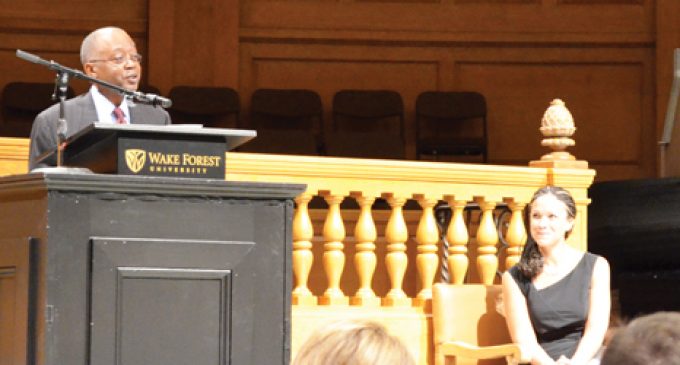Harris-Perry links mental health with bias and other inequities

(pictured above: W. Randy Eaddy, a partner at Kilpatrick Stockton, introduces Melissa Harris-Perry.)
Melissa Harris-Perry made her first local public address Sept. 10 since she joined the faculty of Wake Forest University, her alma mater, earlier this summer. The author, professor and MSNBC talk show host keynoted a fundraiser for the Mental Health Association in Forsyth County, telling a crowd in WFU’s Wait Chapel that public policy in this country is inadequate to address mental health.
“Mental health is a requirement of democracy,” Harris-Perry said. “Health is not solely, or even primarily, located in the body of the patient. Health is best found in the body of politic. When people are sick, the first place we should look for a diagnosis and treatment is in their nation. A sick people is a symptom, not a cause, of a sick democracy.”
Citing the Declaration of Independence and other writings of Thomas Jefferson, Harris-Perry intimated that the government has a commitment to see to the mental wellbeing of its citizens.
“Governments are not just there to protect us; they are not just there for the purposes of protecting our property and managing a fair (distribution) of resources. Governments are there to allow for human flourishing, which is an inalienable right given to the people by their creator,” she said.
She talked about recent statistics that show that blacks’ mental health is better or even with that of whites. Harris-Perry views the research with incredulity. She says blacks’ mental trauma has been internalized.
“How could it be that a group who has such high rates of poverty, such high rates of unemployment, are victimized by so much crime, go to sub par schools and who have such poor (physical) health, all things we know are related to mental health, but when you measure us with the measuring tools of science, (we) end up showing up as though we may be sick but we are not crazy,” she said. “There’s a cumulative biological burden exacted on black bodies as a result of inequality. The reason we don’t appear to be crazy is because our crazy is our sickness. Active coping styles connected with low-resources actually create visible, clear, enduring, negative psychological effects. When you tell people with few resources to work harder, you are killing them.”
Harris-Perry said injustice and bias are directly linked to one’s mental health, and that the effects of discrimination take their toll.
“Inequality exacts a price on our hearts, minds and souls. For some of us the price is exacted in ways that can be moderated and mediated, and people can find a way to cope,” she said. “In the end, the real work of mental health care provisions cannot be about coping. It must be about change.”
Harris-Perry was 16 when she entered Wake Forest as a freshman. She earned BA in English and went on to earn a P.h.D. in political science from Duke. She has served on the faculties at the University of Chicago, Princeton University and, most recently, Tulane. At WFU, she is the endowed Presidential Chair and teaches in the Politics and International Affairs Department. Her eponymous MSNBC show airs each weekend, and Harris-Perry commutes back and forth to New York City to tape it.
Andy Hagler, the executive director of the Mental Health Association in Forsyth County, is pleased to have such a high-profile ally in Harris-Perry. He said mental health certainly needs the spotlight.
“Mental illness is a silent illness because of the stigma that is often associated with disorders such as depression, bipolar disorder, anxiety, post-traumatic stress, schizophrenia and eating disorders,” he said. “Mental illness also knows no racial, gender or social-economic boundaries … We want the community at large to realize that mental illness is real, common and treatable.”
Blake Harrison, a fellow at Wake Forest, said Harris-Perry was spot-on when she described how some try to downplay mental illness.
“A lot of times people say ‘you need to work harder’ or ‘you need to let it go and move on.’ It is really an issue in society that we need to fix so that people don’t have to feel oppressed all the time,” he said.
Sherea Delsol liked what she heard and praised Harris-Perry for making her think.
“You think of mental health separate from race and not something that works together,” Delsol said. “Bringing that view for me was really enlightening. Bringing the historical and political aspect into it was very interesting because you don’t think about the body of politic when you think of mental health.”



















